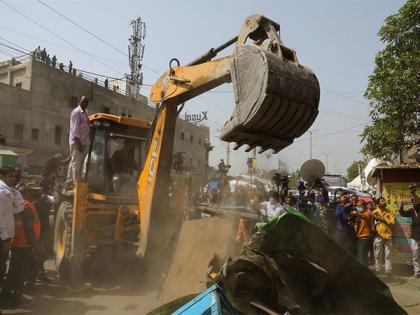Pakistan's war on poor: Lahore traders left in limbo as govt plans demolition of 2,285 shops
By ANI | Updated: July 20, 2025 20:44 IST2025-07-20T20:35:53+5:302025-07-20T20:44:23+5:30
Lahore [Pakistan], July 20 : Traders in Lahore have won a reprieve after spirited protests forced authorities to halt ...

Pakistan's war on poor: Lahore traders left in limbo as govt plans demolition of 2,285 shops
Lahore [Pakistan], July 20 : Traders in Lahore have won a reprieve after spirited protests forced authorities to halt the demolition of nearly 2,300 shops built on the historic Circular Garden, exposing the state's habitual disregard for citizens and heritage alike, Dawn News reported.
Deputy Commissioner Syed Musa Raza confirmed the demolition plan targeting 2,285 shops was paused after angry merchants blocked operations, rejecting mere compensation and demanding alternative premises before vacating the gardens.
Dawn News reported that the encroachments dated back decades, when the administration began collecting rent from shopkeepers who dismantled iconic city walls to build their businesses.
The absence of strategic planning by the Lahore Authority for Heritage Revival (LAHR) is glaring; its fixated focus on restoring colonial-era gardens has blatantly ignored socio-economic realities.
"After encroaching the garden, the then administration...started getting monthly rent...to earn revenue," Raza admitted, underscoring how bureaucratic revenue schemes took precedence over urban welfare, according to reported statements in Dawn News.
Authorities argued that massive traffic jams, pollution, and civic chaos necessitated road widening and garden restoration. But in doing so, they targeted livelihoods without adequately consulting residents. LAHR's hurried demolition plan only triggered a robust backlash.
Initially, compensation offers included one-year profit payouts, quickly rebuffed by vocal traders demanding new shop assignments.
The fallout forced authorities to commission underground parking-plus-market facilities at three historic gates, Taxali, Sheranwala, and Mochi, pledging merchants' safety and infrastructure before evictions could proceed, Dawn News reported.
Punjab Housing Minister Bilal Yasin publicly conceded, "Till completion of new shops [underground], you will not be relocated," after meeting 18 traders' union leaders alongside DC Raza and LDA Vice Chairman Mian Marghoob Ahmad. He credited former premier Nawaz Sharif, who heads LAHR, with ensuring the project will meet "international standards."
Yet, this debacle underscores systemic faults: governance that bulldozes poor traders off historic land, with no prior planning, awareness campaigns, or infrastructural readiness. It reveals the recurring Pakistani state pattern of imposing top-down restoration plans, only backtracking when faced with public fury.
While LAHR and government spin talk of civic amenity upgrades with water, drainage, electricity, security, and parking, the crisis exposes a deeper deficit: a ruling class that flagrantly disrupts lives, then haphazardly fixes consequences. The episode should spark broader questions: In a country so quick to erase community spaces, who truly benefits from "heritage revival"?
Disclaimer: This post has been auto-published from an agency feed without any modifications to the text and has not been reviewed by an editor
Open in app